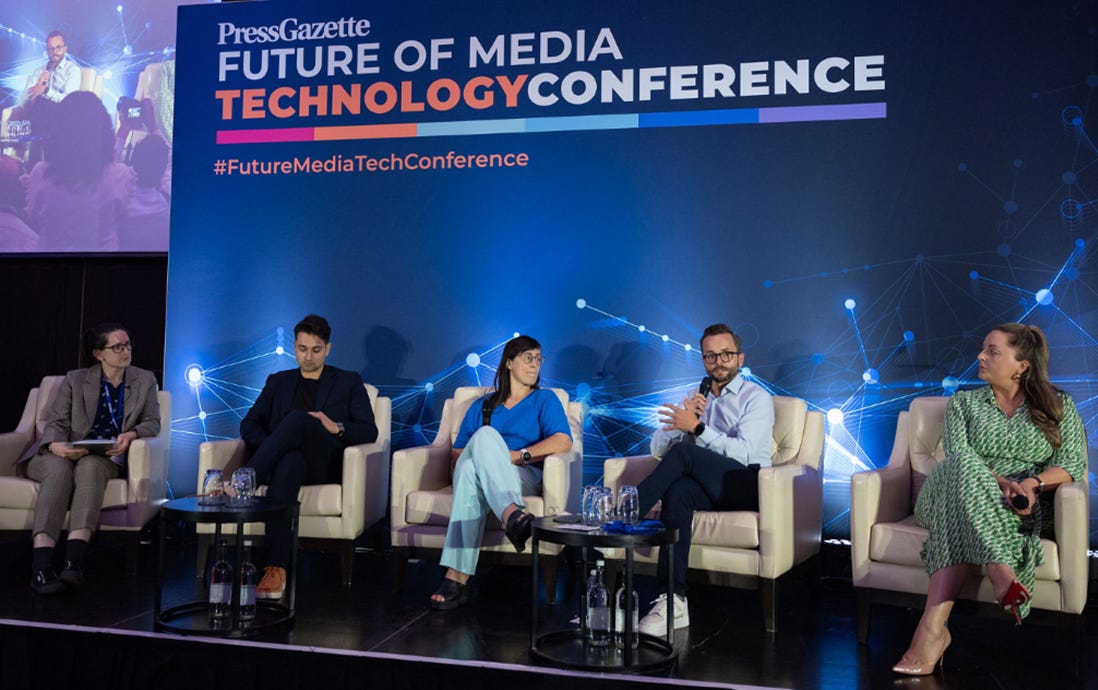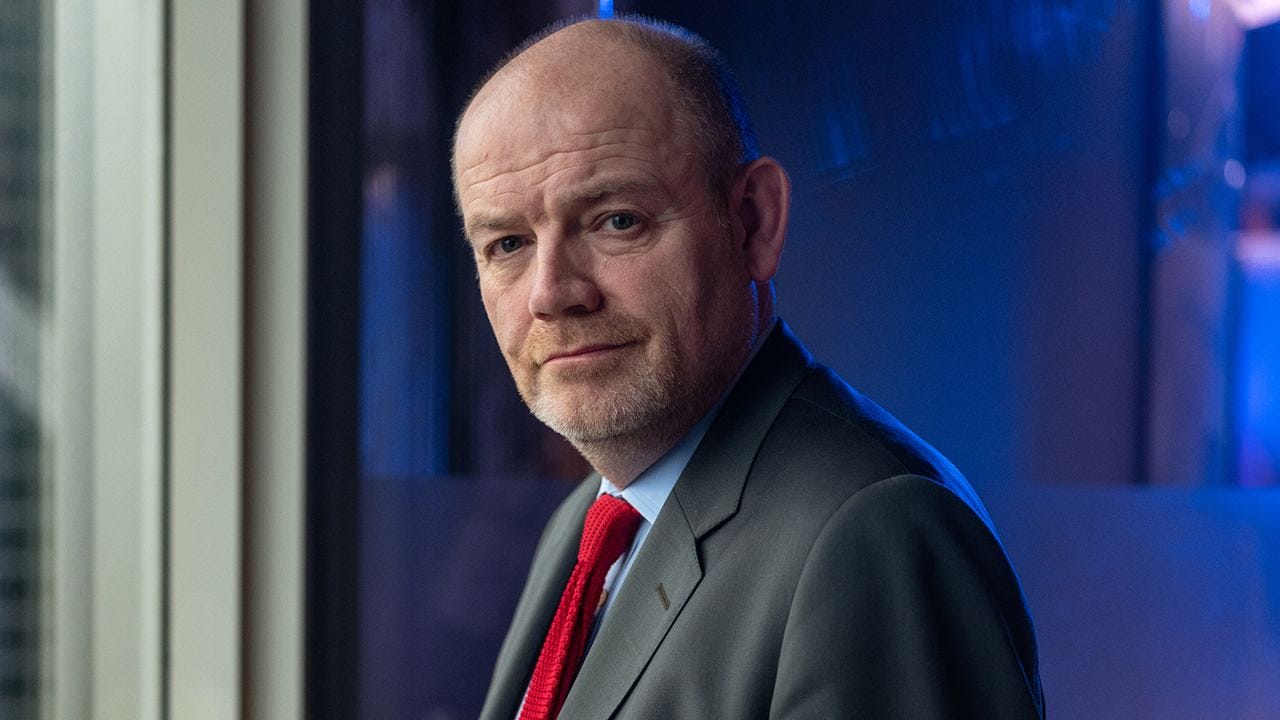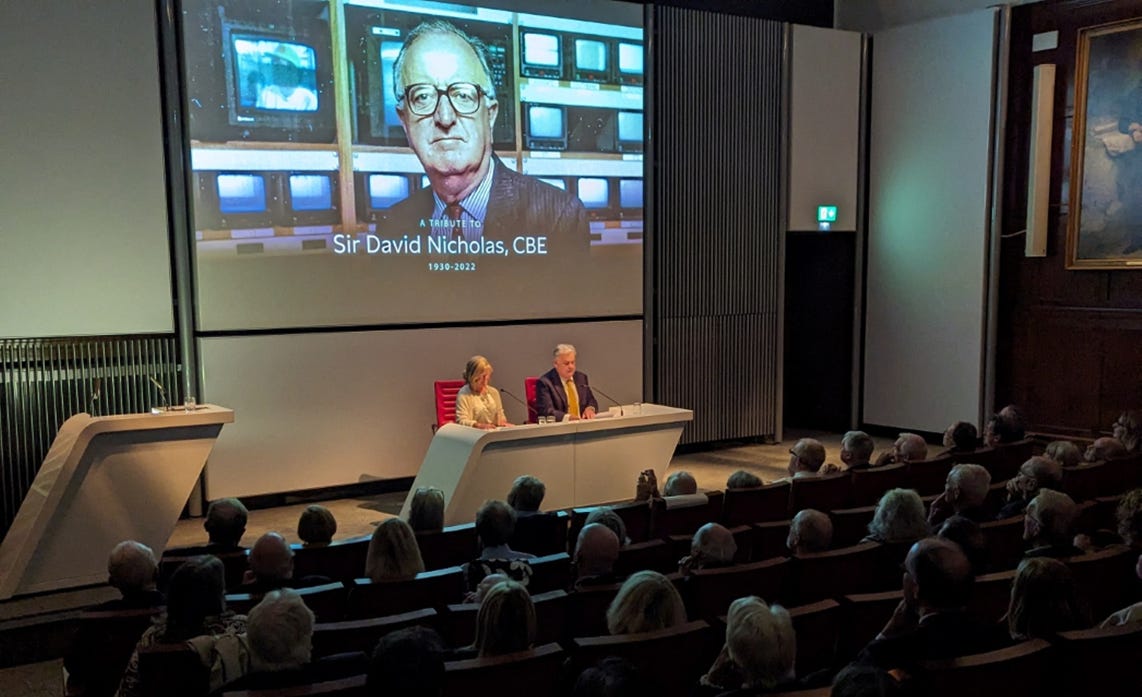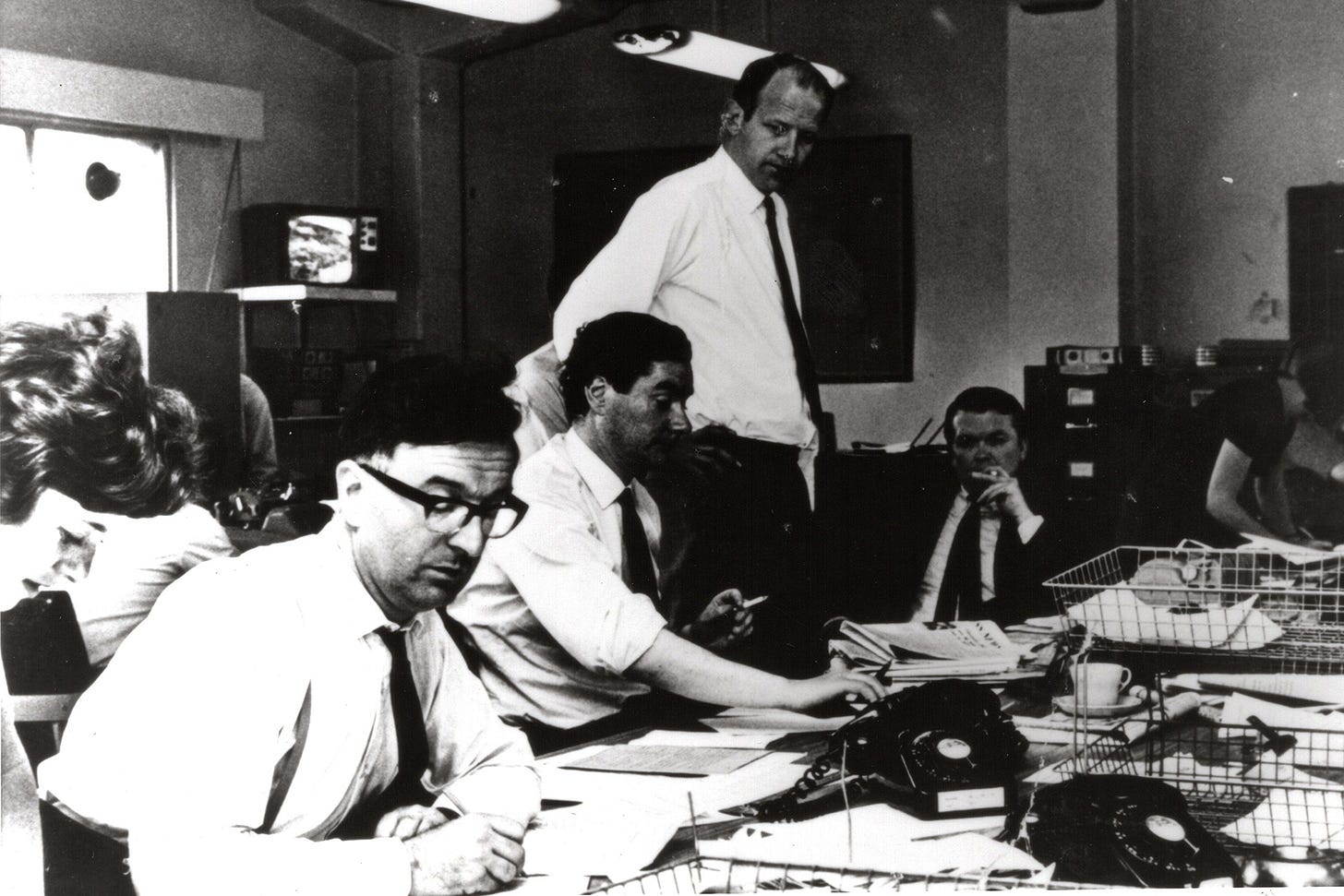AI and TV News, Mark Thompson, and Sir David Nicholas
Thoughts on TV News, journalism, and digital media. Issue#2
Welcome to my latest Substack newsletter. I’m Nigel Dacre, a former TV news journalist, turned media executive. This edition is about AI, CNN and a memorial event for ITN’s David Nicholas.
Generative AI and TV News
A significant focus for this Substack newsletter over the coming year will undoubtedly be generative AI, and its impact on TV News and journalism. I’ve become a bit of a nerd on the subject, and am fascinated by AI’s potential and pitfalls.
I spent 25 years as a production TV news journalist, closely involved in the mechanics of producing TV News programmes - compiling running orders, writing newscaster lead-ins, reviewing reporter scripts, ordering archive pictures, commissioning graphics, working with video editors on packages and video sequences (in house and on the road), and attending news desk planning meetings.
I worked with highly skilled colleagues – specialist lead-in writers and chief subs, reporters, programme editors, video editors, graphic designers, library archivists, and studio control room staff.
And… to be honest, I just can’t see how generative AI won’t impact each and every one of those activities and disciplines. To put it another way, I can’t think of an area of TV news production that won’t be affected by AI.
Yes, human involvement will still be crucial. Indeed, eliminating the more repetitive tasks will no doubt free up time for more creative work and more proactive journalism.
Yes, AI will no doubt lead to new jobs and roles, as some current repetitive activities are replaced by automated systems.
Yes, viewers will expect to see a real human presenting a live TV news programme (although I’m not sure they’ll mind AI presenters delivering social media summaries).
And, yes, there will be a greater premium on eye-witness reporting and camera work out on the road.
But there are still lots of aspects of TV news production that will be impacted by AI.
And, of course, beyond its impact on production roles and newsroom activities, generative AI will also lead to all sorts of misinformation and false videos and images - which in turn, will require newsrooms to develop a range of sophisticated defensive verification systems.
So, one way or another, AI will, in my view, have a transformational impact on TV news. Not straight away, but certainly within a few years.
I’ll delve more into this in the coming months.
ITN’s Jon Roberts and AI
I gained a valuable insight into the AI and journalism debate at the Press Gazette's Future of Media Technology Conference, held in London on Wednesday 6th September.
Jon Roberts, ITN's Director of Technology, Production and Innovation, spoke at the event about how Artificial Intelligence was affecting the ITN1 newsroom. I wrote up the key points of his presentation for the ITN 1955 Club magazine2.
Here is an excerpt from my article:
Jon Roberts, ITN's Director of Technology, Production and Innovation spoke at a Press Gazette media technology event in September about Artificial Intelligence.
He said: “We want to embrace AI wherever we possibly can… but we need to do it responsibly and safely.”
He described generative AI as "very exciting", and that they were in "the co-pilot phase of AI”, with the aim of enhancing productivity and giving journalists better tools for finding and telling stories.
When asked about whether teams are nervous about AI's impact on staff, he replied: “The jobs question comes up very quickly, and we are mindful of this.” He said: "Our job is to be open about AI. We are having a conversation across the company about it.” He said ITN had issued AI guidelines earlier in the year, and since then had set up cross-company working groups to look at the impact of AI.
He argued that AI is particularly good at tagging and searching media content, is already offering new graphics and editing tools, and has huge potential for re-versioning content, including automated transcriptions, translations and summaries.
But he added that "change is difficult to drive in a newsroom”, and many production systems have “become ingrained”. He describes how there was “natural caution” in the newsroom. He said they had discussed how AI may take some of the drudgery away – but then went on to say that some in the newsroom have argued that learning how to do those basic tasks is what makes you a good journalist.
Jon said that in the last year, AI has taken up “an awful lot of my time... It’s a challenge, because it’s moving so quickly. New AI tools are coming out by the week."
He explained that ITN, as a company, had always been affected, every 10 years or so, by new technology, whether it was ENG, SNG, or computer graphics. And now, he said, it’s AI.
An interesting presentation. With my old journalism hat on, if I had to pull out a headline it would be: ITN to embrace AI “wherever we possibly can”.
But a more considered take-away from his presentation is that ITN is clearly taking generative AI seriously, and seeing how it could improve production systems across the company, particularly in providing ‘co-pilot’ functions – but, at the same time, the company is approaching AI cautiously, and there are concerns from staff about how it will affect jobs and roles.
ITN is initially going for the low-hanging fruit – improving tagging and searching for archive video, and automating the reversioning of content in different languages for international clients. But the sense I got from Jon’s presentation, is that ITN is open-minded about more ambitious and radical steps…
Mark Thompson arrives at CNN
At about the time I was programme editing at ITN in the late 1980s and early 1990s, Mark working at a similiar level at the BBC - as an output editor on Newsnight and the Nine O’Clock News. Since then, he has had an extraordinary career trajectory, taking him from CEO of Channel 4 to Director-General of the BBC, and then on to CEO of The New York Times. And, now, he’s started his new role as Chief Executive of CNN.
On his first day, he issued a welcome video to CNN staff. Excerpts of it were reported by CNN’s Oliver Darcy in his Reliable Sources Newsletter.
Oliver quotes Mark as saying:
"Conventional TV will remain critical, but it can no longer define us. It's one platform in a growing portfolio of platforms.
For most people under retirement age, the first place they turn for their news is their phones, not their TV…
"The truth is that despite some recent encouraging developments, like the launch of CNN Max, this company is still nowhere near ready for the future. TV is vital ... but TV is also too dominant at CNN and digital too marginal."
Mark’s message couldn’t be clearer: “Conventional TV can no longer define us”. With sharply declining numbers for its linear channel, the future for CNN needs to be multi-platform and digital.
The problem for Mark is that unlike moving the NYT to a subscription model, moving CNN to a commercially successful digital model won’t be straightforward. It’s going to be fascinating to see how CNN develops under his leadership.
Sir David Nicholas
It’s always difficult to single out one person when talking about the history of a company like ITN - but you could argue that Sir David Nicholas was an absolutely key figure in both the history of the company and the development of TV news.
He sadly died last year, and former ITN colleagues gathered at One Birdcage Walk in London on Friday September 29th for an event to remember him.
The event was based on a news programme format, with David’s son and daughter, James and Helen, introducing archive videos and former ITN staff giving their memories of David.
Those giving their memories included Peter Snow, Jon Snow, Anna Ford and Sir Martyn Lewis.
The ITN CEO Rachel Corp spoke at the memorial. She said: “Sir David ignited a spark at ITN, and it is our duty and privilege to make sure it continues to burn brightly.”
Archive Photo
And news of the David Nicholas memorial is a good excuse to include one of the classic photos of ITN in the 1960s. It shows David in the ITN newsroom in the old Kingsway newsroom in 1967, with Diana Edwards-Jones, Sir Alastair Burnet, Andrew Gardner and George Ffitch. It captures the era brilliantly - with piles of paper, smoking, old ‘rotary’ telephones, small TVs, and even a metal ‘spike’ in front of David for rejected agency stories.
Worth reading…
The veteran British media commentator Raymond Snoddy, writing for the Media Leader asks whether GB News “wants to play by the rules”, and says that Ofcom will look timid if it doesn’t “expedite its investigations”. (The Media Leader)
Rupert Murdoch says he is stepping down as chairman of Fox and News Corp, with his son Lachlan to head both companies. (BBC News)
Four in ten news organisations have not greatly changed their approach to AI in the newsroom since 2019, according to a new LSE survey. (Press Gazette)
Former Head of UK’s Sky News John Ryley calls time on ‘supine’ royal reporting, Westminster gossip and GB News ads boycott. (Press Gazette)
And the BBC’s first disinformation correspondent Marianna Spring talks to the Guardian’s Zoe Williams writes about trolls and conspiracy theories. (The Guardian)
The News Angle Newsletter:
The ITN 1955 Club is for people who worked at ITN. It produces a monthly magazine, The ITN 1955 Newsletter, about ITN history and TV news. Its name is linked to the year that ITN was founded.








